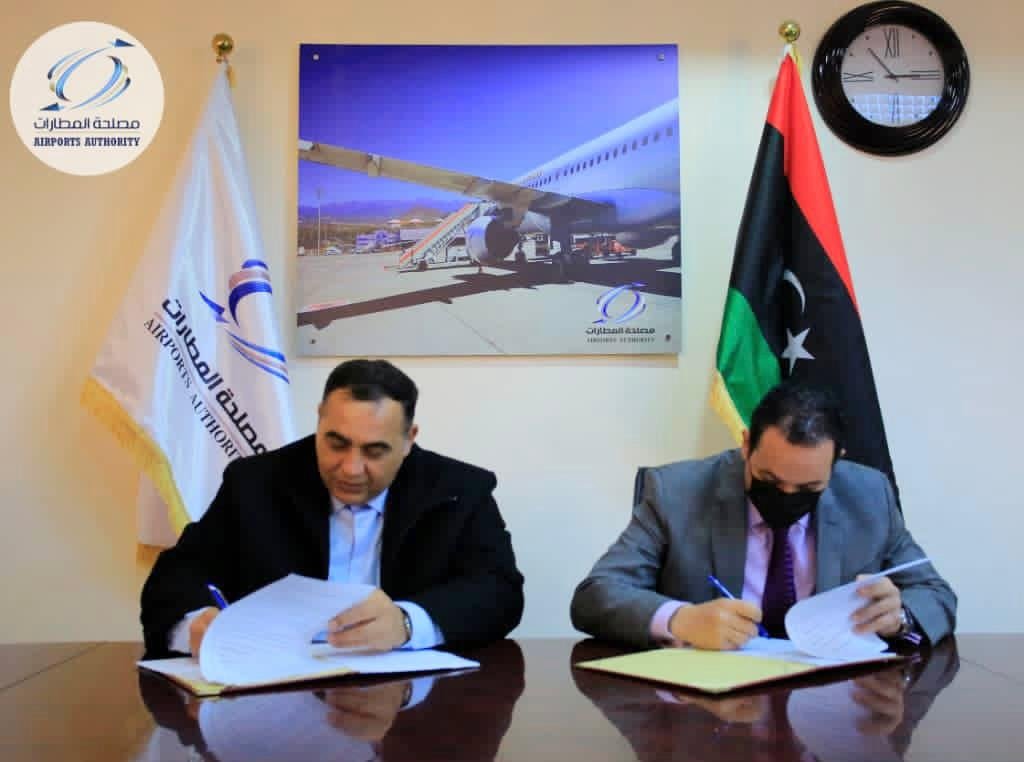Libya’s Airports Authority (LAA) and Misrata Municipality agreed on the construction of a new passenger terminal at Misrata airport on a PPP bases. The old terminal had been destroyed by a fire believed to have been caused by an electric fault.
The announcement came after a meeting yesterday between the two parties during which projects contracted by the LAA during the current year and work being implemented at Misrata airport were reviewed. This included the latest developments in the construction project of the new passenger terminal.
The two sides signed a cooperation agreement through which the Misrata Municipal, in cooperation with businessmen, would establish a departure hall to replace the one burned by a fire according to the designs and specifications approved by the LAA – until the completion of the implementation of the new terminal.
According to the agreement, the Municipality will undertake the periodic maintenance work necessary for the terminal throughout the period in exchange for collecting revenues that will be collected from the rent of offices, shops, cafes, restaurants, and other services, under the direct supervision and follow-up of the airport management.
In turn, the LAA will provide baggage conveyor belt systems, scales, check-in and passport control desks, security inspection devices, and carry out periodic maintenance related to them. The LAA will keep the fees and other sovereign taxes, such as passenger admission fees, baggage fees, and the departure and security tax.
LAA encouraging PPP
The LAA has been keen to encourage PPP projects in the aviation transport sector. It will be recalled that in February 2019 it held a workshop on the topic.
The event had reviewed PPP experiences of other countries, seeking to change the Libyan government’s activity from operating the infrastructure and providing services to focusing on the development of policies, strategies and the monitoring of service providers.
The event had envisioned the role of the private sector based on the implementation of development projects at airports, development and maintenance on a regular basis, upgrading of facilities and provision of high quality services through the utilization of administrative and technical competencies and the financing capacities of the private sector.
At the end of the event, a number of recommendations had been made which to be submitted by the Airports Authority to the competent state authorities to take the necessary action and to promote and upgrade Libyan airports to the standard of those in developed countries.
Libya’s draft PPP law
It will also be recalled that under the Qaddafi regime PPP was discouraged and there had been no legal framework for the PPP concept. In January 2013, however, a Tripoli workshop on PPP revealed Libya’s new PPP draft law.
The event had been organised by the Ministry of Housing and Utilities in association with international legal firm, Clyde & Co.
Opening the event, the then Minister of Housing and Utilities Ali Sherief, highlighted the fact that demand on and competition for Libya’s state budget (LD 66.86 billion in 2013) from other non-development sectors was high, which in reality left very little left over for development and infrastructure investment.
This meant that in reality Libyan citizens did not feel the effect of the development sectors of the budget and development is stifled by lack of funds.
To this end the Minister had said that that his Ministry initiated the PPP law and the workshop to find a new system of funding Libya’s development and infrastructure projects.
Minister Sherief had said that he hoped that the initiative and workshop would come up with innovative ideas and a form of a PPP law for the public and private sectors to work together in all sectors. This included both the local and international private sector, the Minister had added, to form effective partnerships that would help in building the Libyan state.
Presentations had been made at the workshop by local and international experts on PPP including from the Ministry of Finance of Egypt, the Foreign Ministry of Finland, Clyde & Co., PWC, the IFC with a roundtable workshop to come up with some initial recommendations.


















